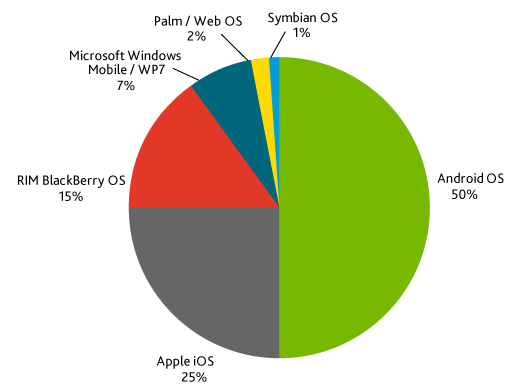The Sharks Are Circling: Microsoft, Oracle Target Android Manufacturers
Android's rise to dominance as a smartphone/tablet OS has reshaped the mobile OS market--but recent actions by both Microsoft and Oracle could damage the operating system's appeal. Oracle and Google are locked in an ongoing lawsuit over Android's alleged infringement on certain Java-related patents, while both Oracle and Microsoft are negotiating licensing agreements with Android device manufacturers.
While this is an ongoing situation, pressure has mounted in recent weeks. Last week, news broke that Microsoft has demanded Samsung pay it $15 per Android device. The deal is similar to one the software giant reached with HTC last year; that handset manufacturer pays Microsoft $5 per Android product. Microsoft has signed similar deals, albeit with smaller companies and for undisclosed sums of money. These agreements are only the most recent developments in what's been a litigious year; Redmond is currently suing both Barnes & Noble and Motorola over their own Android products as well.
Oracle, meanwhile, has done an end run around Google and has raised the issue to handset manufacturers directly. At this point, the conversation is reportedly friendly—Oracle has allegedly asked manufacturers to pay $15-$20 to join an early adopters' program—but the database giant is known for playing hardball. The company's lawsuit, filed in August 2010, seeks damages totaling $2.6 billion and requests an injunction preventing further development or shipment of the Android operating system.

Android has been chomping into overall OS market share for a year. Original graph courtesy of Nielsen
Google itself is partly responsible for the manufacturers' woes. By giving Android away, Google avoids the need to offer any sort of patent infringement indemnification. In this context, an indemnification agreement is a legally binding contract in which Google would agree to pay any patent infringement costs incurred by an Android licensee. These sorts of agreements are standard operating procedure in the IT industry. Given the nature of the US patent system, and the years it can take to settle patent disputes, such indemnities are a virtual necessity.
The various companies squaring off against Google/Android (we've covered Apple/HTC separately) have different motivations and target very different aspects of the operating system. Oracle's lawsuit is essentially an attempt to monetize IP it acquired when it purchased Sun, while Microsoft's lawsuit allows the company to negotiate for access to patents it wants, "encourage" manufacturers to develop for Windows Phone 7, and offers a potential revenue stream. Apple's lawsuits against HTC and Sprint, meanwhile, focus on both physical device design and GUI/software implementations. The three companies scarcely offer a united front.
Device manufacturers may find this fractured offense to be of little comfort. If Oracle, Microsoft, and Apple continue to wring per-device settlements out of the industry, Google's 'free' operating system is going to acquire a substantial price tag. Once the tactic has been proven to work, we can expect a virtual dogpile. Long term, Google may be forced to actually license Android in a way that provides a degree of patent indemnification.
While this is an ongoing situation, pressure has mounted in recent weeks. Last week, news broke that Microsoft has demanded Samsung pay it $15 per Android device. The deal is similar to one the software giant reached with HTC last year; that handset manufacturer pays Microsoft $5 per Android product. Microsoft has signed similar deals, albeit with smaller companies and for undisclosed sums of money. These agreements are only the most recent developments in what's been a litigious year; Redmond is currently suing both Barnes & Noble and Motorola over their own Android products as well.
Oracle, meanwhile, has done an end run around Google and has raised the issue to handset manufacturers directly. At this point, the conversation is reportedly friendly—Oracle has allegedly asked manufacturers to pay $15-$20 to join an early adopters' program—but the database giant is known for playing hardball. The company's lawsuit, filed in August 2010, seeks damages totaling $2.6 billion and requests an injunction preventing further development or shipment of the Android operating system.

Android has been chomping into overall OS market share for a year. Original graph courtesy of Nielsen
Google itself is partly responsible for the manufacturers' woes. By giving Android away, Google avoids the need to offer any sort of patent infringement indemnification. In this context, an indemnification agreement is a legally binding contract in which Google would agree to pay any patent infringement costs incurred by an Android licensee. These sorts of agreements are standard operating procedure in the IT industry. Given the nature of the US patent system, and the years it can take to settle patent disputes, such indemnities are a virtual necessity.
The various companies squaring off against Google/Android (we've covered Apple/HTC separately) have different motivations and target very different aspects of the operating system. Oracle's lawsuit is essentially an attempt to monetize IP it acquired when it purchased Sun, while Microsoft's lawsuit allows the company to negotiate for access to patents it wants, "encourage" manufacturers to develop for Windows Phone 7, and offers a potential revenue stream. Apple's lawsuits against HTC and Sprint, meanwhile, focus on both physical device design and GUI/software implementations. The three companies scarcely offer a united front.
Device manufacturers may find this fractured offense to be of little comfort. If Oracle, Microsoft, and Apple continue to wring per-device settlements out of the industry, Google's 'free' operating system is going to acquire a substantial price tag. Once the tactic has been proven to work, we can expect a virtual dogpile. Long term, Google may be forced to actually license Android in a way that provides a degree of patent indemnification.

